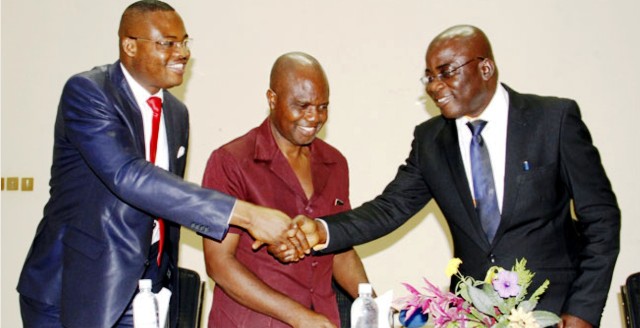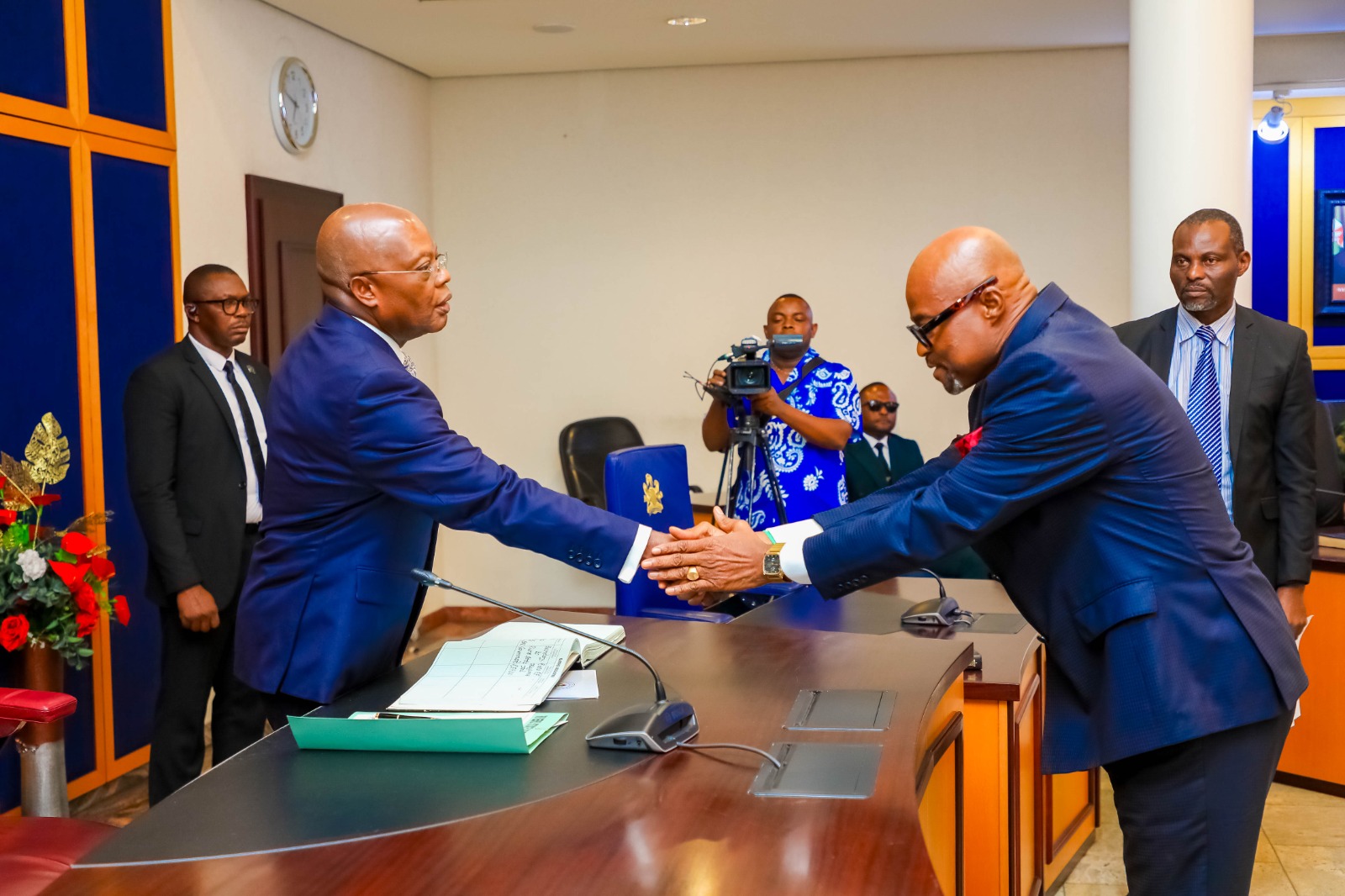Featured
FG Recovers N18bn Looted Funds – Minister

The Attorney-General of the Federation and Minister of Justice, Mr Abubakar Malami (SAN), says the Federal Government has recovered N15billion and $10.5 million so far in its asset recovery drive.
Malami disclosed this yesterday in Abuja when the Senate Committee on Judiciary, Human Rights and Legal Matters visited the ministry on its oversight function to appraise the 2016 budget performance of the ministry.
“Let me put it on record that the Federal Ministry of Justice has equally significantly recorded success in the recovery drive as it relates to the looted funds.
“In that regard and direction, over N15billion has been recovered by the ministry and $10.5million was equally recovered in that direction,’’ Malami said.
The minister said that exclusive of the recoveries, the revenue profile of the ministry as at December 31, 2016, was N12.4million.
He said this was generated from sale of journals, renting of part of the headquarters building to commercial entities, use of its conference hall, tender fees and sale of un-serviceable items.
He added that the total expenditure profile of the ministry within the same period was N3.7billion, including personnel and non-regular allowances.
The chief law officer of the country said that the ministry, by virtue of its mandate, was in a vantage position to articulate and implement the present administration’s broad policy objectives in four major priority areas.
“The anti-corruption campaign, the recovery of stolen national assets, the rule of law component of the anti-terrorism war and the institutionalisation of law and order in all aspects of national life,’’ he said.
On Nigeria’s non-membership of the Financial Action Task Force (FATF), Malami explained that it will take the collaboration of both the executive and the legislature to scale all the hurdles.
“Among some of the demands required to become a member are the passing of the Money Laundering Act, Proceeds of Crime Act and Autonomy of the Financial Task Force.
“All these bills are still pending before the legislature and have not been passed, so we need to work together to get Nigeria registered.’’
The Chairman of the Committee, Sen. David Umaru (APC-Niger) said the 2016 budget was fraught with challenges but noted that the ministry and its parastatals was able to make judicious use of it.
He said the committee was not oblivious of the recent economic challenges in the country and was already preparing for the 2017 budget defence.
Umaru said the committee would work in consultation with the executive, particularly the justice ministry, to ensure that the budget was passed so as to address the economic situation in the country.
He added that the committee was also working to ensure that all bills necessary to make the work of the ministry and its parastatals easier were been looked into with a view to passing them soon.
A member of the committee, Sen. Chukwuka Utazi (PDP-Enugu) decried Nigeria’s non-membership of the FATF.
According to Utazi, as a country that really wants to fight corruption, if we are on the FATF, it will help us to recover some of the stolen assets.
“Nigeria is not a member of FATF, this is a very important membership which we have not yet gotten and this can help us recover stolen assets since it is one of its core mandates.’’
He lamented that office of the attorneys-general always put in applications for membership every year but failed to follow it through.
The lawmaker said that the shuttle diplomacy Nigeria was engaging in would not yield much without a membership of the FATF as no other member would give Nigeria support unless it was registered.
It would be recalled that N3.9billion was appropriated for the main ministry in the 2016 budget with overhead cost taking over N1.7billion.
Meanwhile, the House of Representatives has begun investigation of the allegedly missing $1.1billion signature bonuses which accrued to the country from Oil Prospecting Licences (OPLs).
Consequently, the House has invited the Governor of the Central Bank of Nigeria (CBN), Mr Godwin Emefiele; the Group Managing Director, Nigerian National Petroleum Corporation NNPC), Dr Maikanti Baru, and the Executive Secretary, Department of Petroleum Resources (DPR), Mr Mordecai Baba Ladan, to come and explain the whereabouts of the money.
The chief executives are expected to appear before the ad-hoc committee of the House on Oil Prospecting Licences (OPLs) and Oil Mining Leases (OMLs) on Monday, February 1, 2017.
The committee had Wednesday refused to grant audience to representatives of the agencies, as they observed that none of them could present a letter authorising them to represent their chief executives in that capacity.
The committee particularly complained that the CBN boss had ignored the three letters it had written to the apex bank, and threatened to issue a warrant of arrest on Emefiele should he fail to appear before it as scheduled.
Chairman of the committee, Hon. Gideon Gwani, noted that the signature bonuses paid by owners of some OPLs, which amounted to over $1billion, could not be traced.
According to Gwani, all efforts to trace the money were futile as the DPR, CBN, Petroleum Technology Development Fund (PTDF), NNPC and the accountant-general’s office denied the committee details of the transaction.
He explained that the DPR could not confirm if the fees claimed to have been paid by the oil companies had actually been received by the government through the CBN, the banker to the Federal Government.
“It has been realised through our investigation that we need, seriously, evidence to prove that signature bonuses are paid,” he said.
Gwani stated further that the DPR advised the committee to request the information directly from the CBN, while the CBN told the committee to liaise with the NNPC on OPLs and OMLs, with the DPR on royalties, and with the accountant-general of the federation on signature bonuses.
The committee established that signature bonuses amounting to $835 million, which accrued from OPL 250, 291, 332, 276, 321,323,283,315, 257, 279, 285, 288, 298, 471, 289, 284 and 236, as well as part payment of $271.18 million signature bonuses from OPL 214, 324, 320, 318, 256, 242, 223, 221, 245, 247, 322, 248 and 249, could not be traced.
“We need evidence that full payments were made for OPLs 250, 291, 332, 276, 321, 323, 283, 315, 257, 279, 285, 288, 298, 471, 289, 284 and 236, and the total amount we are looking for is $835 million.
“We also need evidence of part payments of OPLs 214, 324, 320, 318, 256, 242, 223, 221, 245, 247, 322, 248 and 249, which amount to $271.18million, leaving the balance of $648.2million,” Gwani said.
Although the committee acknowledged that most of the OPLs had been converted to OMLs, Gwani said they were listed at their state when the transactions took place.
“Most of the OPLs have been converted to OMLs, but we have chosen to list them at the state at which the debt and payment occurred,” he clarified.
The lawmaker explained that the committee was mandated by the House of Representatives to investigate the award of all OPLs and OMLs granted to oil companies by the Federal Government, to, among other things, ascertain whether due process and guidelines for the acquisition of oil and gas assets were complied with.
“It is, therefore, noteworthy that payment of fees before and after the acquisition of oil blocks fall part of due process required to be fulfilled by the Petroleum Act, which this committee was mandated to investigate,” he said.
Gwani pointed out that the agencies’ refusal to provide required information spoils the image of government and undermines its fight against corruption, adding that “The development is unfortunate, especially at the time when the government is in dire need of money to fund its projects.”
Featured
Bring Your Wealth Of Experience To Governance, Ibas Tasks New SSG

The Sole Administrator of Rivers State, Vice Admiral Ibok Ete Ekwe Ibas (rtd), has charged the new Secretary to the State Government (SSG), Prof Ibibia Lucky Worika to bring his wealth of experience to bear in governance of the State.
Vice Admiral Ibas (rtd) gave the charge shortly after swearing in the new SSG at the executive chambers of Government House on Wednesday night.
The Administrator who congratulated Prof Worika on his appointment said the choice was not merely an administrative decision but a statement of intent.
Vice Admiral Ibas (rtd) explained that the new SSG has an unparallel expertise in law, policy and international governance, which align perfectly with the mission to restore law, order, integrity and public trust in Rivers State.
He said: “To our new SSG, the task ahead is onerous, but your track record leaves no doubt in our minds that you will prove your mettle. Rivers State needs your intellect, grit and unweaving dedication. Together, we will write a new chapter of progress for this great state.
“Prof Worika’s role will be critical in driving this vision, ensuring that every policy, every decision and every action is in consonance with this administration’s mandate to restore law and order, stabilize the polity and to create the necessary conditions for the restoration of democratic institutions and representations.”
Vice Admiral Ibas (rtd) pointed to his maiden address to Rivers people wherein he emphasised that his administration will be committed to delivering an effective governance that is anchored on transparency, accountability and service.
He therefore, enjoined the new SSG to brace up to the demands of his office, and offer his best service as required while also working cooperatively with civil servants.
Vice Admiral Ibas (rtd) said: “You have no time to settle down. You must roll up your sleeves and get to work with the team.
“Our civil servants with whom we will work closely to run this administration are critical stakeholders and we must work with them to ensure that the state continues to function effectively during this administration.
“To the Permanent Secretaries and civil servants as a whole, once more I will ask your kind cooperation and support as we work to achieve our objectives at this time,” he added.
Featured
I Am One Of You, Sole Administrator Tells Rivers People …Warns Against Violence, Crude Oil Sabotage

The Sole Administrator of Rivers State, Retired Vice Admiral Ibok-Ete Ibas (rtd), has assured residents that he is not in the State as a partisan actor or political competitor but as a stabilising force to restore governance and order.
In a state broadcast yesterday, Ibas, who assumed duty at Government House, Port Harcourt, emphasised his commitment to protecting civil liberties and ensuring the safety of all citizens.
However, he issued a stern warning against crude oil sabotage and violence, urging residents to resist any temptation to return to past hostilities.
“For decades, I have dedicated my life to the service of our great nation—first as the 20th indigenous Chief of Naval Staff and later as Nigeria’s High Commissioner to Ghana. I answered this call out of the need for peace in Nigeria, and most importantly, in Rivers State,” Ibas stated.
Describing the prolonged political impasse as a major setback to governance and democracy, he acknowledged the hardships faced by families and businesses due to the prevailing uncertainty.
“As a son of the Niger Delta, I am one of you. I feel the weight of this crisis on families, businesses, and the future of our people,” he said.
Ibas commended President Bola Tinubu’s decisive action in declaring a state of emergency in Rivers State, stressing that it was a necessary move to restore stability and revive economic activities.
“My mandate is clear: restore law and order, ensure stability, and create an enabling environment for economic growth. But this mission requires collective support from all stakeholders, regardless of political affiliation or ethnicity,” he stated.
He discouraged attacks on oil infrastructure, reminding residents of the devastating environmental and economic consequences of such actions.
“The Niger Delta has moved beyond the destruction of oil facilities. We must resist the temptation to return to those ugly days,” he cautioned.
While pledging to uphold civil liberties and the rule of law, the Sole Administrator warned that lawlessness and violence would not be tolerated.
“We will not act arbitrarily, but we will not hesitate to deal decisively with anyone who threatens the peace and stability of Rivers State,” he declared.
Ibas revealed that he had concluded a State Security Council meeting where strategic measures were outlined to de-escalate tensions and prevent further conflict.
Expressing gratitude to President Tinubu for entrusting him with the responsibility, he also acknowledged the National Assembly for approving the emergency declaration.
“I will work closely with the national leadership under the guidance of the President. I am optimistic that Rivers State will emerge stronger and greater,” he concluded.
Featured
Abuja Truck Explosion Death Toll Rises To 10 …As Another Truck Crashes On Same Spot

The Federal Capital Territory Emergency Management Department has confirmed that 10 persons have died in the truck explosion that occurred near Karu bridge, along the Abuja-Keffi Expressway, on Wednesday.
The FEMD’s Head of Public Affairs, Nkechi Isa, confirmed the numbers in a statement, yesterday.
The Acting Director General of the Emergency Department, Abdulrahman Mohammed, had earlier confirmed that eight persons had died as of yesterday morning, with five confirmed dead on the scene, and four others burnt beyond recognition.
““Five people were taken dead from the scene yesterday (Wednesday). Out of the people that were injured, one died, making six. Then this morning (yesterday), when I asked my people to go round, they discovered that two had already died again, making eight. Four of them from yesterday were burnt beyond recognition.”, he explained.
However, in her statement, Isa said the Head, Forecasting Response and Mitigation of FEMD, Mr Mark Nyam, said eight bodies were deposited at the Karu Hospital Morgue, one body at the Asokoro Distinct Hospital Morgue while another body was deposited at the National Hospital.
He added that some victims had been referred to the Gwagwalada Teaching Hospital, Federal Medical Centre, Keffi, and Cedercrest Hospital Abuja for proper care.
Part of the statement reads, “The FCT Emergency Management Department FEMD can confirm that 10 persons lost their lives to the truck explosion that occurred at Karu bridge along Abuja / Keffi expressway.
“The Head Forecasting Response and Mitigation of FEMD, Mr Mark Nyam said eight bodies were deposited at the Karu Hospital Morgue, one body at the Asokoro Distinct Hospital Morgue while another body was deposited at the National Hospital.”
He informed that over 30 persons suffered various degrees of burns.
“Some of the victims have been referred to Gwagwalada Teaching Hospital, Federal Medical Centre,Keffi and Cedercrest Hospital Abuja for proper care,” he said.
Isa also stated that no fewer than 10 vehicles were burnt during the incident, adding that the FEMD boss after a visit to the incident scene, appealed to motorists to observe traffic rules and regulations.
He also cautioned against reckless driving, dangerous overtaking and poor maintenance of vehicles, while urging FCT residents to always use the 112 emergency toll free number in the event of an emergency.
Meanwhile, barely 24 hours after the incident, another fertiliser-laden truck has collapsed on the same spot.
The Tide learnt that the incidence occurred at about 3:54pm yesterday.
The Head of Public Affairs of the FCT Emergency Management Department, Nkechi Isa, confirmed the accident in a statement, stating that the truck collided with a Hijet and a dump truck, adding that no life was lost.
She cautioned road users to drive with caution as the Federal Road Safety Corps was making efforts to tow away the affected vehicles, to avoid traffic built up.
“Another accident has occurred under Karu bridge along the Abuja-Keffi Expressway. Thankfully, no life was lost to the incident. Our Search and Rescue say the accident occurred when a truck laden with fertilizer ran into a Hijet and a dump truck also known as tipper.
“Motorists are advised to drive with caution as the Federal Road Safety Corps is taking steps to tow away the affected vehicles in order to avoid traffic built up,” the statement read.
Meanwhile, several videos showed some persons trying to clear the fertiliser bags from the fallen truck to ease traffic.
-

 News2 days ago
News2 days agoUS Supreme Court stops Trump from deporting migrants
-

 Maritime2 days ago
Maritime2 days agoEnugu Plans Intra Rail System To Boost Trade
-

 Rivers2 days ago
Rivers2 days agoBSN Advises Churches In Bille To Unite For Revival
-

 Sports2 days ago
Sports2 days agoNSC, NCS Approve Fixed Calendar For Sports Festival
-

 News2 days ago
News2 days agoEaster: Fubara Urges Support For Tinubu
-

 Politics2 days ago
Politics2 days agoObi Urges Prayers For ‘Tender-Hearted, Caring’ Leaders
-

 News2 days ago
News2 days agoEx-SGF Tasks Leaders On Patriotism, Integrity
-

 Maritime2 days ago
Maritime2 days agoCustoms PTML Command Rakes In N90.2bn In Q1 2025

